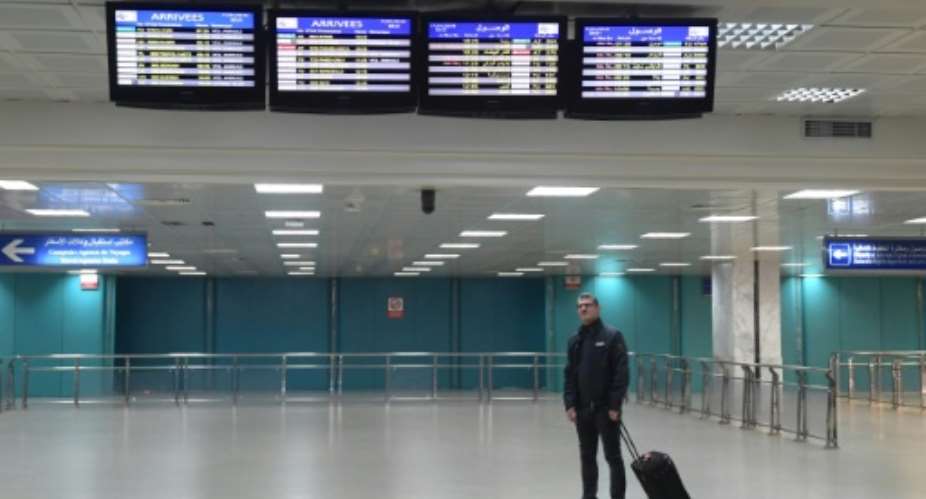A public sector strike brought Tunisia to a standstill Thursday as workers heeded calls from a powerful trade union to stay home over demands for wage hikes and economic reforms.
Across the country, schools were closed, public offices shuttered and transport paralysed after calls for a 24-hour strike by the Tunisian General Labour Union (UGTT).
The international airport in Tunis was hit hard, with thousands of travellers stranded without flights or information.
The UGTT had addressed its call to the country's 677,000 civil servants and 350,000 employees of state-owned companies, who make up nearly a quarter of the Tunisian workforce.
Protesters took to the streets of the capital chanting "the Tunisian people do not accept humiliation", criticising Prime Minister Youssef Chahed's for bowing to reforms dictated by the International Monetary Fund (IMF).
Some held portraits of IMF chief Christine Lagarde, with a bright red X painted over her face.
Tunisia is seen as having had a relatively smooth democratic transition since the January 14, 2011 toppling of president Zine El Abidine Ben Ali after 23 years in power.
But price hikes fuelled by the fall of the Tunisian dinar, combined with tax increases and stubborn unemployment, have spurred social discontent.
In 2016, the IMF granted Tunisia a 2.4-billion-euro loan over the span of four years in exchange for a promise to carry out economic reforms and to control civil service salaries to avoid pushing up the public deficit.
 Tunisia trade union head Noureddine Taboubi addresses a crowd during a general strike in the capital Tunis on January 17, 2019. By FETHI BELAID (AFP)
Tunisia trade union head Noureddine Taboubi addresses a crowd during a general strike in the capital Tunis on January 17, 2019. By FETHI BELAID (AFP)
"The UGTT will oppose the failure of the liberal choices of these leaders," UGTT head Noureddine Taboubi told the crowd, speaking from a balcony at the union's headquarters.
In Sfax, the second largest city in the country, thousands of demonstrators took to the streets.
The union has called for wage hikes for public sector employees to counter the decline in purchasing power due to inflation, which stands at 7.5 percent.
In a televised speech Wednesday, Prime Minister Chahed said public finances meant he could not accept the union's demands, adding that dialogue would continue after the strike.
"It is the wage increases conceded after the revolution in the absence of real growth that have led to inflation, debt and declining purchasing power," he argued.
Economist Ezzedine Saidane blamed Tunisia's economic problems on a long-term "lack of overall vision".
He told AFP structural reforms rather than a wage hike were needed "to limit inflation and boost job-creating growth".
Thursday's strike was the first to bring together employees from both the public sector and state-owned companies.
In November, Tunisian civil servants staged the biggest general strike in years.





 Burkina Faso expels French diplomats for 'subversive activities'
Burkina Faso expels French diplomats for 'subversive activities'
 GOIL reduces petrol price by 29 pesewas, sells GHC14.70 per litre
GOIL reduces petrol price by 29 pesewas, sells GHC14.70 per litre
 The disrespect towards security is terrible; we can do better — Atik Mohammed co...
The disrespect towards security is terrible; we can do better — Atik Mohammed co...
 Starlink to cease connection in Ghana, other “unavailable” countries on April 30...
Starlink to cease connection in Ghana, other “unavailable” countries on April 30...
 MMCEs, DCEs and Regional Ministers must be elected to reduce political interfere...
MMCEs, DCEs and Regional Ministers must be elected to reduce political interfere...
 National Cathedral: ‘Nonsense; you take taxes from broke Ghanaians to dig a clum...
National Cathedral: ‘Nonsense; you take taxes from broke Ghanaians to dig a clum...
 April 18: Cedi sells at GHS13.59 to $1, GHS13.01 on BoG interbank
April 18: Cedi sells at GHS13.59 to $1, GHS13.01 on BoG interbank
 We must harness the collective power and ingenuity of female leaders to propel o...
We must harness the collective power and ingenuity of female leaders to propel o...
 Saglemi Housing Project will not be left to rot – Kojo Oppong Nkrumah
Saglemi Housing Project will not be left to rot – Kojo Oppong Nkrumah
 Asantehene commends Matthew Opoku Prempeh for conceiving GENSER Kumasi Pipeline ...
Asantehene commends Matthew Opoku Prempeh for conceiving GENSER Kumasi Pipeline ...
